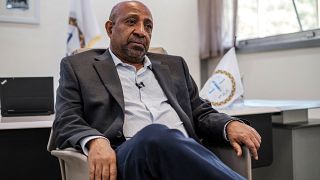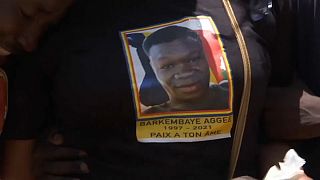Ethiopia
Ethiopia faces a growing crisis of ethnic nationalism that some fear could tear Africa's second most populous country apart.
The winding road to the country's western Tigray region displays the ruins of war: the charred remains of armoured personnel carriers, the mangled bed of a truck, the pockmarked walls of an industrial park.
There is no phone or internet service.
Six months have passed since the government launched a military operation in the Tigray region to capture its fugitive leaders.
The authorities' annexation of a vast part of western Tigray has forced hundreds of thousands of Tigrayans to seek refuge elsewhere, including across the border in nearby Sudan.
Widespread atrocities are reported and thousands have been killed.
In Gondar city, set amid rocky hills, a man in civilian clothes but carrying an AK-47 described himself as a member of an Amhara militia as he walked to another part of the city while residents celebrated Orthodox Easter on Sunday.
Such militia members are accused of committing abuses in western Tigray.
But Nega Wagaw disagreed.
"The (Amhara) militia does not participate in politics .....let us focus on the problems that face the country as a whole. As the militia, we are ready to defend Ethiopia at any time," he told The Associated Press.
Orthodox monk, Aba Yosief Desta, preferred not to discuss the ethnicities of victims in the widening conflicts threatening Ethiopia's unity.
"Christians are not committed to killing each other. The intention of the political groups is to oversee more killing. The problem is Ethiopia's political orientation," he said, speaking to The Associated Press from the city of Gondar, where he manages a diocesan office,
Meanwhile, in other parts of Ethiopia, other ethnic groups say they have been targeted, too.
Scores of people have been killed in clashes this year between the Amhara and the Oromo, Ethiopia's two largest ethnic groups.
With the rising violence, some wonder how the government will pull off national elections in June.
Africa's second-most populous country, with 110 million people, faces a growing crisis of ethnic nationalism that some fear could tear it apart as the federal government asserts its authority in regions such as Tigray.
As that war reaches the six-month mark on Tuesday, there is no sign of how it might be resolved for the Tigray region's estimated 6 million people.
The United Nations human rights office has said all sides are accused of committing abuses against civilians, although far more of the killings, rapes, and mass expulsions are attributed to Ethiopian forces, allied Amhara regional forces, or, especially, troops from neighbouring Eritrea.
Over the weekend, Ethiopia's Council of Ministers almost certainly ended hopes of negotiations for peace when it designated as a terrorist organization the Tigray People's Liberation Front, or TPLF, the regional party which dominated a coalition of groups that ruled Ethiopia from 1991 until Prime Minister Abiy Ahmed took office in 2018.
The TPLF, like some others in Ethiopia, is an ethnic-based party that has long represented the people of Tigray in accordance with the country's 1995 constitution, which enshrines ethnic federalism. Under that constitution, regional leaders have been accused of asserting the rights of majority ethnic groups at the expense of minorities.












01:05
Ethiopia's mega-dam on the Nile is "now complete", Prime Minister says
Go to video
Ethiopia's opposition party denounces ban as threat to peace deal
Go to video
Record volume and revenue for Ethiopian coffee exports
Go to video
Kenya set to surpass Ethiopia as East Africa’s largest economy in 2025 – IMF
Go to video
World Food Programme to halt aid for 650,000 women and children in Ethiopia
Go to video
Ethiopians mark Easter with calls for peace and love amid ongoing conflict